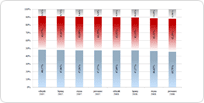Hakom - Croatian Post and Electronic Communications Agency
e-Agency
Users:
Cost Estimator
The Holder of Framework Programme
GIS portal
Privacy calculator
Application ''Quiz''
Market survey
HAKOM at BEREC’s Extraordinary Plenary Meeting
NEWSThe comments from the public consultation on the Guidelines on implementation of Network Neutrality Rules were discussed at BEREC’s extraordinary plenary meeting in Brussels.
ZAGREB, August 25, 2016 - The BEREC’s extraordinary plenary meeting (Body of European Regulators for Electronic Communications) was held in Brussels where there was a discussion on draft guidelines on implementation of the obligations of national regulatory authorities (hereinafter: the Guidelines on network neutrality), aimed at their final adoption.
After the adoption of Regulation (EU) 2015/2120 on establishing measures concerning access to the open Internet (hereinafter: the Regulation on network neutrality), which guarantees access to the open Internet, BEREC was given the task to issue guidelines that will help the regulatory authorities for the Electronic communications in the EU to control supervision and implementation of the Network Neutrality Regulation whose purpose is to enable a transparent and non-discriminatory open access to the end-users. The public consultation on draft Guideline ran in the period from June 6 to July 18, 2016 where almost half a million contributions were received. The finalisation of the Guidelines will be presented to the citizens at BEREC press conferences, to be held on August 30, 2016, starting at 2 PM. The above press conference can be followed via web streaming (http://berec.europa.eu/).
In addition to network neutrality, the upcoming amendments to the regulatory framework for the Electronic communications were the subject to discussion. Mr Günther Oettinger, European Commissioner for Digital Economy and Society attended a part of the meeting with whom the views were exchanged on strategic issues related to the forthcoming change of the regulatory framework that will try to respond to current and future challenges in the Electronic communications sector.
In addition to the above mentioned the discussion topic was on the international roaming and the status of so-called OTT services in the new regulatory framework.
Since, starting with 15 June 2017 the roaming charges for the end-users should be completely abolished within the EU, BEREC is helping the European Commission with its opinion in the preparation of the so-called standards of fair use safeguard which will prevent abuse when using roaming services at local prices.
Taking into consideration that the Commission plans to present a legislative proposal for a comprehensive reform of telecommunications regulatory framework in September, among the topics at the meeting it was discussed about the BEREC’s position on the status of the so-called OTT services (services such as WhatsApp, Viber and Skype) within the new regulatory framework.
After the adoption of Regulation (EU) 2015/2120 on establishing measures concerning access to the open Internet (hereinafter: the Regulation on network neutrality), which guarantees access to the open Internet, BEREC was given the task to issue guidelines that will help the regulatory authorities for the Electronic communications in the EU to control supervision and implementation of the Network Neutrality Regulation whose purpose is to enable a transparent and non-discriminatory open access to the end-users. The public consultation on draft Guideline ran in the period from June 6 to July 18, 2016 where almost half a million contributions were received. The finalisation of the Guidelines will be presented to the citizens at BEREC press conferences, to be held on August 30, 2016, starting at 2 PM. The above press conference can be followed via web streaming (http://berec.europa.eu/).
In addition to network neutrality, the upcoming amendments to the regulatory framework for the Electronic communications were the subject to discussion. Mr Günther Oettinger, European Commissioner for Digital Economy and Society attended a part of the meeting with whom the views were exchanged on strategic issues related to the forthcoming change of the regulatory framework that will try to respond to current and future challenges in the Electronic communications sector.
In addition to the above mentioned the discussion topic was on the international roaming and the status of so-called OTT services in the new regulatory framework.
Since, starting with 15 June 2017 the roaming charges for the end-users should be completely abolished within the EU, BEREC is helping the European Commission with its opinion in the preparation of the so-called standards of fair use safeguard which will prevent abuse when using roaming services at local prices.
Taking into consideration that the Commission plans to present a legislative proposal for a comprehensive reform of telecommunications regulatory framework in September, among the topics at the meeting it was discussed about the BEREC’s position on the status of the so-called OTT services (services such as WhatsApp, Viber and Skype) within the new regulatory framework.
The Croatian Regulatory Authority for Network Industries (HAKOM) was represented by Domagoj Jurjević, Deputy President of the Council of HAKOM.
# # #
For additional information please contact:
Croatian Regulatory Authority for Network Industries (HAKOM)
Roberta Frangeša Mihanovića 9
10110 Zagreb, Croatia
Tel. + 385 (0) 1 700 70 07
Fax + 385 (0)1 700 70 70
Media inquiries can be submitted online using HAKOM’s official website:
Registration required.
ABOUT HAKOM: HAKOM (www.hakom.hr) - Croatian Regulatory Authority for Network Industries – ensures preconditions for a fair market competition, stable growth and environment for innovations in the electronic communications and postal services market. HAKOM protects users’ interests and the possibility of choice among various communications and postal services at affordable prices, defines sustainable competitive conditions for operators and service providers under fair conditions for return on investment, and provides support to economic growth, public services and the quality of life in the Republic of Croatia by using modern technologies. HAKOM’ strategic goals are: to promote regulation of the electronic communications and postal services market, to support growth of investments and innovations in the electronic communications and postal services market, to provide efficient use of limited resources, to accelerate the growth of broadband products and services, to provide affordable offers of communications and postal services, to provide protection and informing of users, to build an efficient and comprehensive information system, to define and implement efficient processes, and to acquire multi-disciplinary competencies in market regulation.












